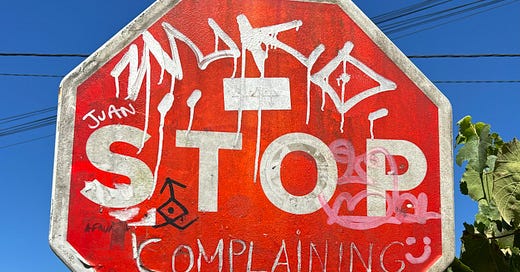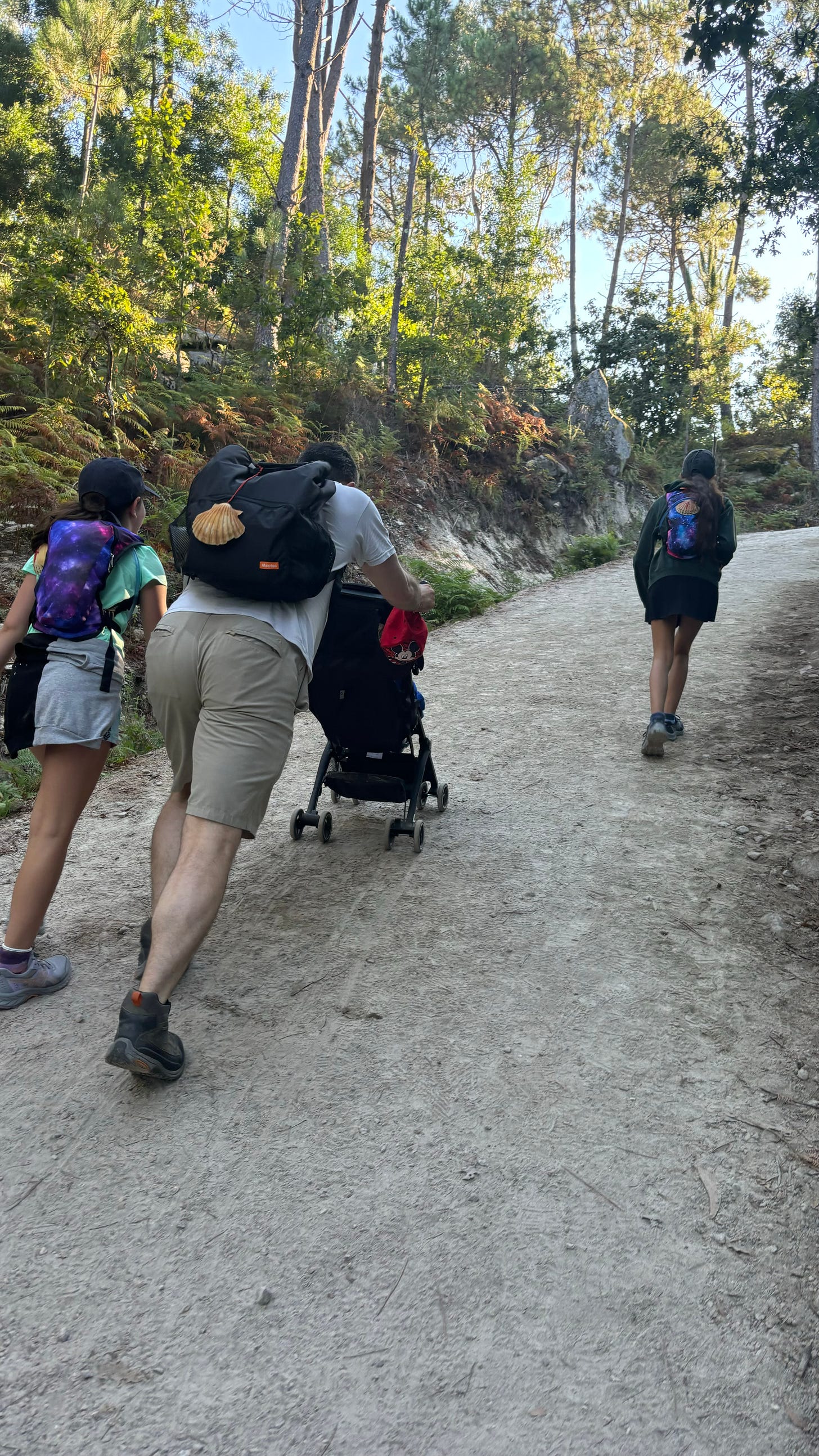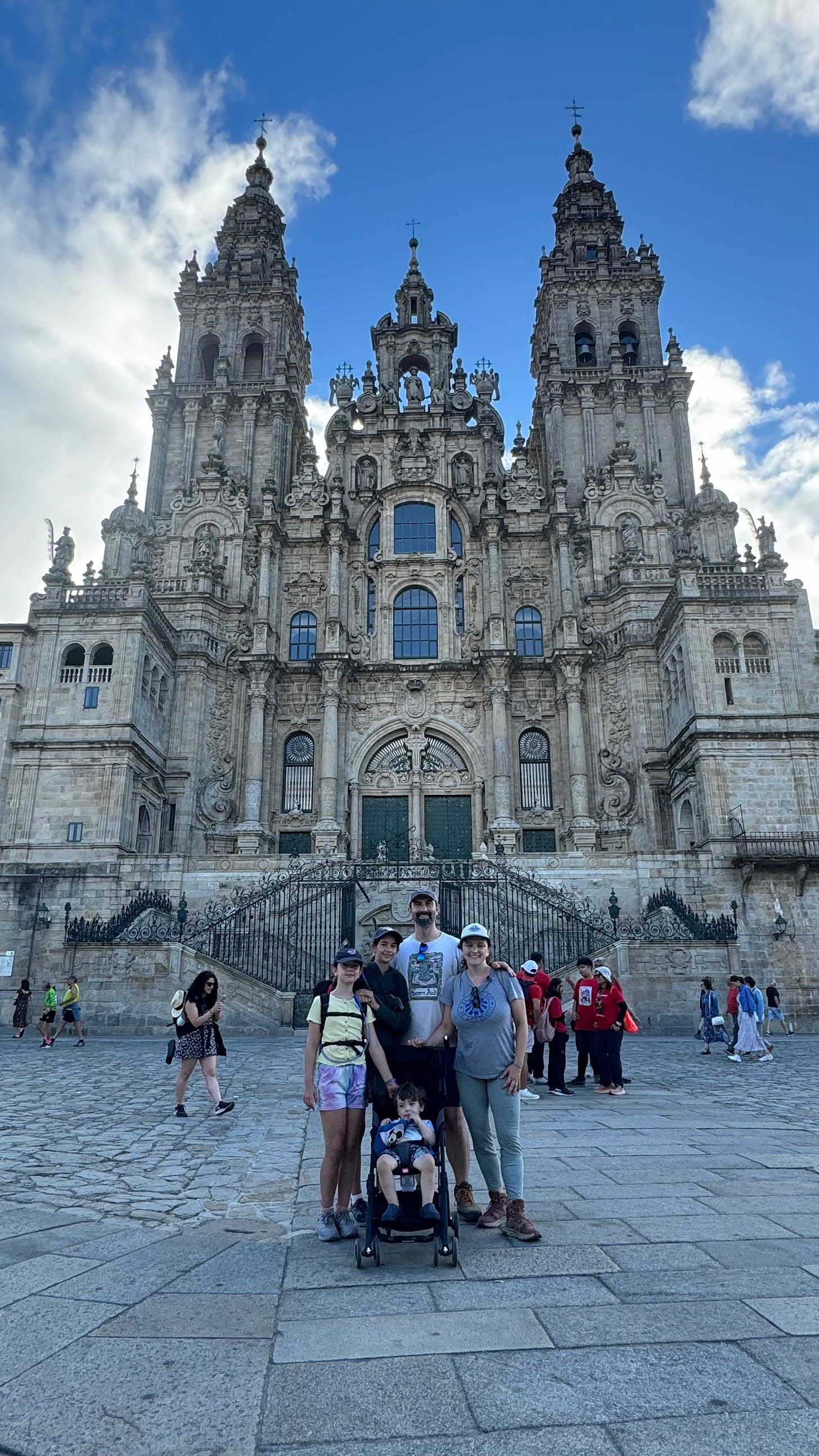I am going on a journey and I am taking my toddler, my husband, and my two stepdaughters, almost-ten and thirteen. Along for the ride is an “all-terrain” stroller that fits in a backpack and a backpack baby carrier.
Together, we are walking 101,000 meters from Vigo, Spain to Santiago de Compostela.
This is my second Camino, the first completed in my third trimester of pregnancy with my two-year-old still in my belly. That journey, which lasted 42 days and covered some 480 miles, was one of self-enforced solitude, an inward quest for self and truth before a new life arrived to break me open and tap my reserves.
“You are as strong as you think” I am fond of saying to myself and others when they come to understand how far I walked in such a compromised state. The human body is capable of so much more than we often give it credit for.
My second Camino was born of the first. My stepdaughters followed my 40-day journey in postcards and maps, imagining where I was and how far I’d walked and wondering when they, too, might undertake such a journey.
The idea emerged in earnest when my son turned one. Would it be possible? To walk 100 kilometers with a baby on my back? My husband’s chronic hip arthritis gave us pause. I’d need to be prepared to carry my son most of the way. But I’d walked eight times as far with him on the inside, surely five days at twelve miles a day with 30 pounds on my back wouldn’t kill me?
We settled on the Portuguese Camino because it came highly recommended and offered an accessible 100 kilometer route. We would fly to Porto, take a car to Vigo, and begin our walking journey there, sending our luggage ahead by a daily transfer service. We’d reach Santiago in five days or six, depending on how the first few days developed.
On the first day of walking, we waved good-bye to our suitcases, stashed behind our pensión door.
“I don’t like leaving them there,” our thirteen-year-old said. “What if they don’t make it?”
“They will,” I said, cheerfully.
“How do you know?” she asked, skeptical.
“Because I trust that the people who are coming to get them will do as they’ve said,” I replied.
“I don’t trust other people,” she said, slowly.
My husband and I exchanged glances, our first teaching moment already upon us.
“Well,” he said, gathering his thoughts, “trust is something you give other people so they can give it back to you. And sometimes they’ll disappoint you, but the only way to know is to try.”
My stepdaughter considered this perspective, turning it over in her mind like a stone. I saw the gears processing all the times she had already been disappointed in her short life, wondering if she wanted to give her trust to the mysterious people who would fetch and carry our bags.
That evening, we would walk into our albergue to find our luggage, as though by magic, waiting just behind the door.
“It’s here!” my stepdaughter exclaimed happily, not so much surprised as relieved not to have to weather the disappointment of its absence, that the mystery luggage transit service was something she could, perhaps, trust.
Padre Ángel’s words have always stuck in my head: life is the Camino and the Camino is life, he said. It will show you all of yourself in what is functionally a moment but which will feel, in its experience, like an eternity.
What is the purpose of life on planet earth? To let our bank accounts grow fat while we toil in service to others? Or to test our mettle against the trials of existence?
Any long distance walk in hot weather over varied terrain (or conversely across long expanses of flatness will show you something about yourself: the strength of your legs, your tolerance for heat. But giving yourself over walking, day after day, has the two-fold effect of hardening the body and softening the heart. It deepens the body’s connection to nature and heightens our awareness of human technology, be that roads, cars, running water, or smartphones.
The fountain discovered after three miles without water is a blessing. The Substack notification in the pocket is a bother.
Who will you trust in your moments of trial?
Will the objects and people around you exceed your expectations or disappoint you?
Who will you become in the altered reality where there is nothing to do but walk and think?
My legs have passed this test before, and I know I can trust them to carry me again. My feet will ache with the groan of hard work, but they will not scream in agony as they did when a small creature growing inside me compromised my legs’ circulation.
My mind will relish the chance to wander and the easy chatter of my companions will fill the space I might have otherwise yearned to fill with podcasts or the strains of Sara Bareilles.
My toddler will show up, making a nap schedule that suits his jet lag and his mood, whether on my back or in his stroller, the true champion of the journey, which will carry my 30-pound son well over 60 of our ~67 miles.
My husband and co-parent will surpass all expectations as a partner, remembering things I have forgotten, pushing the stroller farther and more dexterously than I. Quickly, in the course of 36 hours, we will build new patterns, new habits, for how to pack four suitcases and get them and our three children out the door of a hotel room in 45 minutes before 8am.
My stepdaughters will both meet and exceed all expectations. Our ten-year-old—who would regularly lose her head if not attached to her body—will almost forget her flip flops (her only other pair of shoes) under her bed. Our thirteen-year-old will sporadically let her “teen” show in her mood. But most of every day, they will walk willingly and enthusiastically, even when exhausted, volunteering to take turns pushing the stroller—over gravel, up hills, down steep slopes—coddling their brother with doodles, high fives, and fist bumps when he threatens a toddler grumpy-storm.
Even when our family spends time together, we rarely spend such extended periods of time together so actively engaged with one another. Moments of whimsy and wonder give way to history lessons and memories—of Millennial adolescence, of Roman history, of my first Camino. We are walking together through antiquity and writing a new story at the same time.
At each stop, we seek a stamp in our pilgrim credential that will earn us a Compostela when we reach Santiago. Every hospitality establishment has created an inked emblem of their identity to satisfy our craving for more stamps, all but the ice cream parlors, which are perhaps too busy serving locals to realize they are passing up a great opportunity for free advertising.
Almost every church welcomes its pilgrims as early as 8am with a stamp to begin the day, offering a moment to pause and reflect on the 1,200 years of history that precede us in this place, the gilded altars, carefully designed and crafted by long-dead journeymen learning from their masters. Camino is an act of faith—in yourself, in your body, in God. It reminds us that whether you think you can or you cannot, you are right.
Until life – God? The universe? – shows you what you can’t control.
Four months before this Camino began, I found out I was pregnant. I wondered, momentarily, if this was some kind of divine gift. Perhaps I was simply born to be a pregnant pilgrim. How would I weather the walk with my toddler on my back and another child, five months along, in my belly? But this euphoria was short-lived as the pregnancy was lost before it even had the chance to root, leaving me with something else to carry – the misshapen twins of both grief and relief: grief of a life that would not be lived, relief that I could take this walk unencumbered by it. As I felt myself get stronger as I walked, I sent up a prayer of gratitude to feel my body as my own at the same time that I mourned what might have been.
Every Camino meets its end. The approach to the cathedral is always a kind of anticlimax that makes me think of death, the approach of a terminus I cannot relish because I do not want the journey to be over. Yet, end it must – Padre Ángel was right.
Still, the victory of completion comes with its own reward, even when others disappoint you.
On the day of our departure, the reception staff at our four-star hotel will prove themselves unable to summon a cab to carry our six bags to the train station, blaming their failure on it being Sunday afternoon.
Left with no other choice, I will carry three rolling suitcases, a backpack, an over-shoulder bag containing the baby carrier. and a toddler travel crib more than a kilometer by myself, one final breakdown in an otherwise nearly flawlessly laid week of plans. A journey of relative ease should offer one nearly insurmountable trial. Perhaps my forearms are stronger than they were a week ago for having pushed my toddler those 60+ miles, but rolling 70 pounds in one hand and two suitcases held together in the other, draws a sweat without causing me undue pain.
You can trust yourself as far as you’re willing to push yourself. And even if you stumble, the earth will be there to catch you when you fall.







Alicia, I love this. Thank you.
A lovely account. I am so impressed at your family's willingness and ability to do this walk together! Loved the story about trust at the end -- and the "one more thing" trial in the "afterlife" of your Camino. 🙂